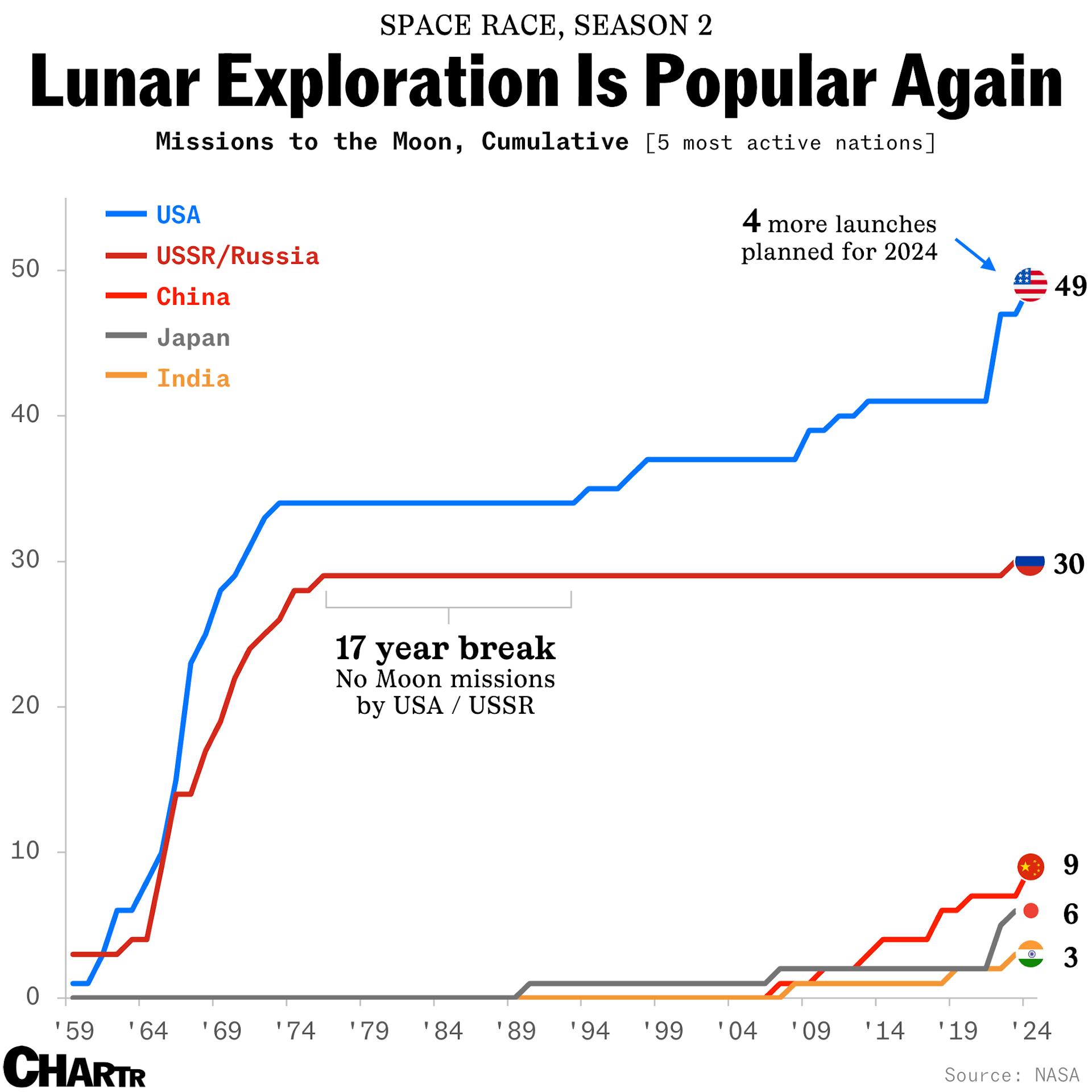
Posted on 06/28/2024 8:44:25 PM PDT by SeekAndFind
On Tuesday, the WSJ reported that a lunar capsule carrying the first rock samples from the far side of the Moon had touched down on Earth, marking a significant milestone in space exploration. But, unlike the pioneering missions of the space race of decades past, this cutting-edge endeavor wasn’t masterminded by the US or Russia, but by China.
China's lunar ambitions have been growing steadily since its Chang'e 1 lunar orbit mission in 2007, with NASA data revealing that the country has now made 9 missions to the Moon. But, collecting rocks is just one small step in China’s plans: the country wants to put astronauts on the surface by 2030 and build a base on the lunar south pole, in conjunction with Russia, by 2035.

Meanwhile, after decades focused on the Earth’s orbit and the International Space Station, NASA has rekindled its own lunar ambitions with the Artemis program. Launched in 2017, Artemis has the out-of-this-world aim to "learn how to live and work on another world as we prepare for human missions to Mars". Like China and Russia, America’s plans for a permanent lunar base also center around the strategically important lunar south pole.
The risk, of course, is that this new space race exacerbates the tensions between China and the US. There are legal accords, most notably the Outer Space Treaty, which precludes nations from claiming sovereignty over the Moon. But if your chief economic rival is on the Moon and you’re not, then pieces of paper thousands of miles away could be hard to enforce.
Furthermore, China isn’t the only new country in this space race, with more than 70 countries now boasting a space program. The other difference compared to the 1960s is the new role of private companies: 5 out of the 6 Artemis launches this year are part of NASA's Commercial Lunar Payload Services initiative, which allows companies to bid on delivering payloads for NASA. America’s most recent mission, for example, saw the Odysseus lander launched on a SpaceX Falcon 9 rocket.
China lost the space race more than 50 years ago.
Space is vast—and this is just the beginning of the race.
In one hundred years the scorecard may look very different.
Thanks Bill Clinton, thanks Bernie Schwartz and Loral Space 🖕
More like the beginning of the beginning.
1,000 years from now, we will still be confined to this solar system.
There will be no practical or profitable way to transport space natural resources to Earth, even if the resources exist.
1,000 years from now, we will still be confined to this solar system.
—
Could I borrow your Crystal Ball? I need some stock tips.
You do not need a crystal ball.
1,000 years from now, we will still be at the Basic Research level.
Profits - if any - will take millennia of Basic Development.
Space tourism and Space Thrill Rides might be profitable - until the first mass casualty event, at which point the lawyers will take charge from the scientists, the engineers, and the entrepreneurs.
I guess you do not keep up with basic physics and propulsion methods. Which are currently outstripping the chemical rockets by a lot; to implement them just require political will and money, not time.
Then there was Project Orion in the 60s, killed in 64 by infighting and lack of political will, but would have had us in the entire solar system by now with the first returns from interstellar flights already happening.
The only place basic physics and new propulsion methods make a profit are in Hollywood, California.
If we are lucky, nuclear fusion generated electricity might reach FINANCIAL break even by 3024.
Its not worth going on with such a technical blockhead who refuses to learn anything new.
Disclaimer: Opinions posted on Free Republic are those of the individual posters and do not necessarily represent the opinion of Free Republic or its management. All materials posted herein are protected by copyright law and the exemption for fair use of copyrighted works.